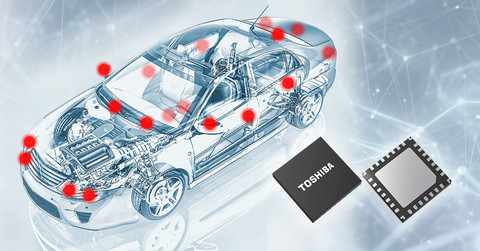Toshiba Is Sampling an Automotive CXPI Responder Interface IC that Contributes to Shorter Software Development Times
Industry’s first[1] CXPI responder interface IC with built-in hardware logics
Toshiba: TB9033FTG, an automotive Clock Extension Peripheral Interface (CXPI) responder interface IC. (Graphic: Business Wire)
KAWASAKI, Japan--(뉴스와이어)--Toshiba Electronic Devices & Storage Corporation (“Toshiba”) has today started to provide samples of “TB9033FTG,” an automotive Clock Extension Peripheral Interface[2] (CXPI) responder interface IC that conforms to the CXPI standard for automotive communications protocols.
TB9033FTG is the industry’s first[1] IC of its type with built-in hardware logics[3], which control transmission and reception by the CXPI protocol and general purpose input/output (GPIO). This eliminates the need for development of dedicated software and contributes to shorter product development times.
The new IC has 16 GPIO pins. Six can be switched to AD converter input, and four to pulse width modulation (PWM) output. It also integrates functions that allow use in a broad spectrum of automotive applications: input monitoring during Sleep Mode; switch matrix (max 4×4) input; and output in the event of communications disruption.
Fault detection circuits for overheat, overvoltage and low voltage are built into the IC. It also can detect conditions that precede an abnormality and send the data to the commander node, improving fault detection performance in automotive applications.
The operating temperature range is from -40 to 125°C which is suitable for automotive applications, and the IC will conform to the AEC-Q100 qualification standard for automotive electronics.
The new product’s support for multiplexing automotive communications and reducing the number of wire harnesses used in body control systems will contribute to lower vehicle weight.
Toshiba is also developing an automotive CXPI communications driver receiver IC “TB9032FNG” that can be switched between commander node and responder node via an external pin.
Notes:
[1] As CXPI interface IC for responder nodes. As of September 3, 2024, Toshiba survey.
[2] CXPI (Clock Extension Peripheral Interface): A communications standard, developed in Japan for automotive sub-networks derived from LIN[4].
[3] Logic circuits configured with hardware without a microcontroller.
[4] LIN (Local Interconnect Network): A communications standard for lower-cost, lower-speed on-board subnetworks than provided by CAN[5].
[5] CAN (Controller Area Network): A serial communications standard, primarily used for automotive communications networks.
Applications
Automotive
· Body control system applications (steering wheel switches, meter cluster switches, light switches, door locks, door mirrors, etc.)
Features
· Responder interface IC conforming to the CXPI standard for automotive communications protocols
· High-speed response suitable for automotive body system applications (compared with LIN)
· 16 GPIO pins (four can be switched to PWM output, another six can be converted to AD converter input)
· Switch matrix (max 4×4) input function
· Fault detection functions (This product can detect conditions that precede an abnormality and automatically send the data to the commander node.): Overheat, overvoltage and low voltage
· Low current consumption (Standby Current): IVBAT_SLP=10μA (typ.)
· Low EMI and high EMS make noise design easier
· Highly resistant to static electricity due to its high ESD resistance
· To be AEC-Q100 qualified
Main Specifications
(To view the table, please visit https://www.businesswire.com/news/home/20240902053955/en/Toshiba-Is-Sampling-an-Automotive-CXPI-Responder-Interface-IC-that-Contributes-to-Shorter-Software-Development-Times)
Follow the link below for more on the new product.
Follow the link below for more on Toshiba’s products for automotive network communications.
Automotive Network Communication
* Company names, product names, and service names may be trademarks of their respective companies.
* Information in this document, including product prices and specifications, content of services and contact information, is current on the date of the announcement but is subject to change without prior notice.
About Toshiba Electronic Devices & Storage Corporation
Toshiba Electronic Devices & Storage Corporation, a leading supplier of advanced semiconductor and storage solutions, draws on over half a century of experience and innovation to offer customers and business partners outstanding discrete semiconductors, system LSIs and HDD products.
Its 19,400 employees around the world share a determination to maximize product value, and to promote close collaboration with customers in the co-creation of value and new markets. The company looks forward to building and to contributing to a better future for people everywhere.
Find out more about TDSC at https://toshiba.semicon-storage.com/ap-en/top.html



